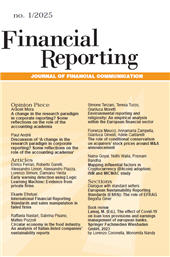The role of conditional conservatism on acquirers' stock prices around MeA announcement
149-175 p.
Purpose: This study investigates the relationship between conditional conservatism and the market reaction of firms' stock prices in Mergers and Acquisitions (M&A) operations. Design/methodology/approach: Leveraging a sample of 224 U.S. listed companies and event study methodology, as well as regression models, this study analyses 735 M&A deals from 2010 to 2018. Findings: We find that conditional conservatism is positively associated with cumulative abnormal returns of acquiring firms post-M&A announcement; moreover, one of the drivers of this result is the information asymmetry channel. Additional analysis also shows that while acquirers with high conditional conservatism experience a positive reaction to M&A announcements, there is no significant reaction for acquirers with low conditional conservatism. Originality/value: Our main results provide evidence that a high conditional conservatism limits the reduction of acquiring firms' stock prices post-announcement of MeA. Our additional analyses show that
low conditional conservatism does not exert a significant negative impact on acquiring firms' stock prices post-announcement of MeA, as would be expected. Practical implications: This paper may be useful for both investors and practitioners since it offers interesting insights on how to deal with accounting policies and benefit from M&A transactions. Indeed, if they are informed on how conditional conservatism exerts a role on stock prices, they are less likely to engage in value-destroying M&A transactions. In addition, our results may interest standard setters interested in the role of the conservatism principle under the Generally Accepted Accounting Principles. [Publisher's text]
-
Articoli dello stesso fascicolo (disponibili singolarmente)
-
Informazioni
Codice DOI: 10.3280/fr202517552
ISSN: 2036-6779
PAROLE CHIAVE
- conditional conservatism, market reaction, stock prices, acquirer firms, MeA, event study


